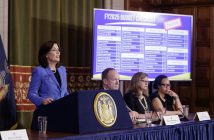With the declaration of a national emergency centered around the COVID-19 coronavirus, and new frightening statistics emerging daily concerning our health and economy, we are living in uncertain and unprecedented times. Employers are trying to navigate these challenging times and to establish a new normal for their employees. While companies still have flexibility to determine what works best for their particular workplace, there are wage and hour, leave, disability and other employment law related issues that need to be considered in their decision making.
As a preliminary matter, it likely goes without saying that employers should encourage proper hand washing and appropriate cough and sneeze etiquette, and should take extra precautions to ensure that the workplace is adequately sanitized (e.g., routinely clean all frequently touched surfaces, such as elevator buttons, door knobs and common workstations). Employers should also actively encourage employees who are sick or who show any signs of illness to stay home. To the extent that employees do not heed that warning and show up to the workplace with signs of illness, they should be immediately separated from other employees and sent home. The CDC is also advising employees with symptoms of respiratory illness to stay home and not come to work until they are free of fever (100.4° F or greater using an oral thermometer), signs of a fever, and any other symptoms for at least 24 hours, without the use of fever-reducing or other symptom-altering medicines (e.g. cough suppressants). Contrary to many employers’ policies, the CDC is also recommending that employers do not require a healthcare provider’s note for employees who are sick to return to work because doctors’ offices are overburdened by sick patients and many not be able to provide such documentation in a timely way. Companies should also be aware that employees may need to stay home to care for sick family members. New York’s Paid Family Leave and New York City’s Earned Safe and Sick Time Act may provide eligible employees with compensation in certain of these circumstances.
While many travel related issues have become moot in light of restrictions that have been imposed, in any event, many companies have discontinued all nonessential business travel and are discouraging employees from personal travel. Many companies are also requiring employees to remain out of the workplace for 14 days following such travel in accordance with the CDC’s guidance concerning the estimated incubation period for the virus.
As many workplaces are moving toward a virtual reality, there are additional issues that need to be considered for remote workplaces. The most common questions that we have been addressing involve employees who are working from home, either voluntarily or involuntarily (at the employers’ determination), and those who are told to stay home without work to do. The most frequent question: do they get paid?
Nonexempt workers do not have to be paid if they do not perform any work. However, it is important to have a mechanism in place to record any time that they do work to ensure that there is no off-the-clock work issue. As for exempt employees, those who are working from home must be paid. As always, exempt workers are not paid based upon the quantity of work, so if they are working from home, they must be paid their regular salary. However, for employers with a sick leave or PTO policy, exempt employees can use available PTO, or if exhausted, do not need to be paid for days in which they do not perform any work.
Employers also need to be cognizant of possible disability, Family and Medical Leave Act and other leave issues related to employees who are infected with the coronavirus or who have other serious health conditions.
We are also carefully watching pending legislation, the Families First Coronavirus Response Act, which has been passed by the House of Representatives and which is awaiting consideration by the Senate. If passed, this legislation would, among other things, provide broader coverage for employees under the FMLA, including reducing the requirements for eligibility and partial payment of 2/3 of the employees salary for up to 10 weeks (capped at $4,000 per month). Additionally, the Act would provide paid sick leave benefits for up to 80 hours for full time employees. We will provide further information concerning this important legislation as it progresses in the Senate.
Finally, employers need to make sure that any decisions that they make are done in a consistent and unbiased way, and also in a way that protects employee confidentiality rights. While this difficult time is presenting new and unexpected challenges for nearly all companies, Ruskin Moscou Faltischek, P.C. remains ready to assist employers in plotting a course through these uncharted waters.














